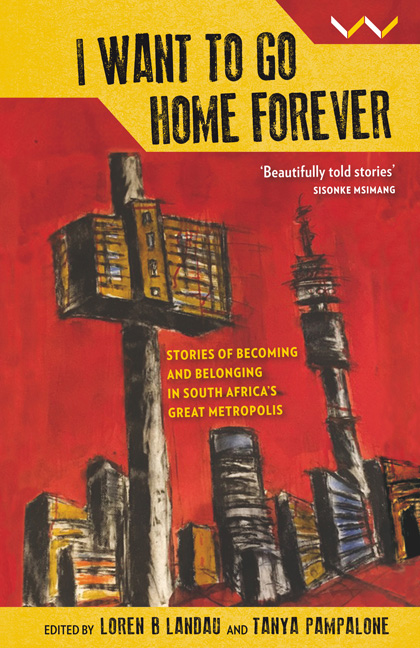Book contents
- Frontmatter
- Dedication
- Contents
- Foreword
- Preface
- Maps
- Introduction
- 1 A bed of his own blood: Nombuyiselo Ntlane
- 2 This country is my home: Azam Khan
- 3 On patrol in the dark city: Ntombi Theys
- 4 Johannesburg hustle: Lucas Machel
- 5 Don't. Expose. Yourself: Papi Thetele
- 6 The big man of Hosaena: Estifanos Worku Abeto
- 7 Do we owe them just because they helped us?
- 8 Love in the time of xenophobia: Chichi Ngozi
- 9 This land is our land: Lufuno Gogoro
- 10 Alien: Esther Khumalo*
- 11 One day is one day: Alphonse Nahimana*
- 12 I won't abandon Jeppe: Charalabos (Harry) Koulaxizis
- 13 The induna: Manyathela Mvelase
- Timeline
- Glossary
- Selected place names
- Contributors
11 - One day is one day: Alphonse Nahimana*
Published online by Cambridge University Press: 29 May 2019
- Frontmatter
- Dedication
- Contents
- Foreword
- Preface
- Maps
- Introduction
- 1 A bed of his own blood: Nombuyiselo Ntlane
- 2 This country is my home: Azam Khan
- 3 On patrol in the dark city: Ntombi Theys
- 4 Johannesburg hustle: Lucas Machel
- 5 Don't. Expose. Yourself: Papi Thetele
- 6 The big man of Hosaena: Estifanos Worku Abeto
- 7 Do we owe them just because they helped us?
- 8 Love in the time of xenophobia: Chichi Ngozi
- 9 This land is our land: Lufuno Gogoro
- 10 Alien: Esther Khumalo*
- 11 One day is one day: Alphonse Nahimana*
- 12 I won't abandon Jeppe: Charalabos (Harry) Koulaxizis
- 13 The induna: Manyathela Mvelase
- Timeline
- Glossary
- Selected place names
- Contributors
Summary
In 1994, the year of the mass slaughter of the Tutsi in Rwanda by ethnic Hutu extremists, Alphonse Nahimana was a 24-year- old living in Kigali with the Tutsi mother of his two-year- old child. He was the youngest of six children, identifying as ‘mixed race’, since his mother was Tutsi and his father, a Hutu farmer. All his family members had died in the genocide or in the refugee camps in Burundi or the Congo, save one brother who, he would later discover, was alive and in jail in Rwanda. After the genocide, Nahimana traversed the continent, trying to create a life for himself. He finally arrived in South Africa in 2001. He worked as a car guard in shopping centres in Johannesburg for many years, but recently found work in a small library in the city.
I do not understand why God lets bad things happen to human beings. If we say we are all in God's image and then you see that God's image destroyed by some other God's image and then God keeps quiet and lets it happen, it's confusing to me. And then we read the Bible and we hear from the preachers and pastors that we are all equal, but then I go to sleep under the Mandela Bridge and someone else goes to sleep in Sandton? Then you tell me we are equal? I don't understand.
We are equal where? We are equal in which situation? Even in education we are not equal. Our lifestyle is not equal. It confuses us and that's how we fight, that's how we become jealous, that's how we kill each other, how we hurt each other. Because we are not equal. We discriminate against each other. That's how racism started. That's how xenophobia started. When you finish eating you throw the bread in the dustbin and somebody else comes to look for that bread in the dustbin. Do you think you are equal to this person?
Inequality is an example of what affects my faith. It's a question I have. Where is God when something bad is happening?
JUMPING OVER BODIES
By 1994 I was living in Kigali and helping my brother in his business, where we exported and imported goods, the kind of goods you might find in a supermarket.
- Type
- Chapter
- Information
- I Want to Go Home ForeverStories of Becoming and Belonging in South Africa's Great Metropolis, pp. 154 - 167Publisher: Wits University PressPrint publication year: 2018



